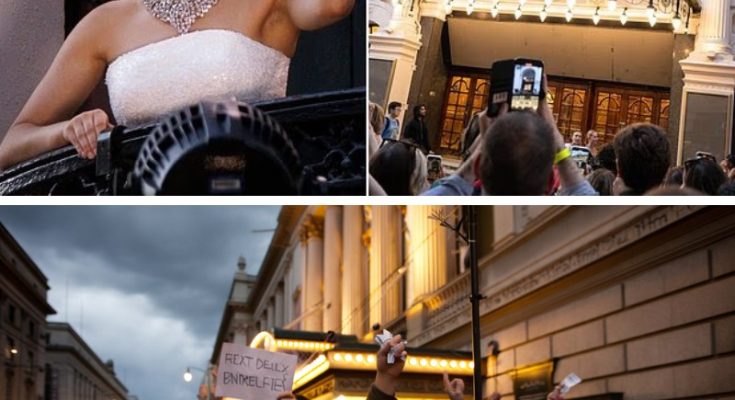On June 30, 2025, the West End’s London Palladium became the epicenter of a heated debate as Rachel Zegler’s performance of Evita took an unconventional turn, leaving paying audiences outraged and demanding refunds. The 24-year-old actress, known for her roles in West Side Story and Disney’s Snow White, has been captivating London audiences as Eva Perón in Jamie Lloyd’s revival of the Andrew Lloyd Webber and Tim Rice musical. However, her decision to perform the iconic “Don’t Cry for Me Argentina” from the theater’s external balcony for free to street crowds—while ticket holders inside watch via a video feed—has ignited a firestorm of criticism. With tickets costing up to £245 ($330), fans argue the move is unfair, thrusting Zegler and the production into a contentious spotlight that challenges traditional theater norms.
The Controversial Performance
The controversy erupted during the show’s second act, around 9:00 PM BST each night, when Zegler steps onto the Palladium’s balcony to deliver the musical’s showstopping number. This staging choice, directed by Jamie Lloyd, aims to mirror Eva Perón’s historical balcony addresses to the Argentine masses, with Zegler singing to hundreds of onlookers gathered on Argyll Street. Inside, the 2,286-seat theater projects the performance on a large screen, a decision intended to enhance the production’s thematic resonance but one that has backfired with paying customers.
Since previews began on June 14, the free outdoor performance has drawn crowds of up to 1,000 people nightly, fueled by viral social media clips and word-of-mouth buzz. Zegler, dressed in a blonde wig and a sparkling white gown, delivers a powerful rendition that has been praised for its clarity and emotional depth, evoking comparisons to past Evitas like Patti LuPone and Madonna. Yet, the move has divided audiences, with ticket holders feeling cheated after spending significant sums—prices range from £29.50 to £245—only to miss the live experience of the song’s climax.
The situation escalated during a recent UK heatwave, when paramedics were called to assist spectators outside suffering from sunstroke and dehydration after waiting hours in the sun. This added a layer of safety concerns to the already brewing discontent, with some blaming Zegler’s appearance for endangering fans, though the production’s team insists the decision was artistic, not reckless.
Public Outrage and Refund Demands
The backlash has been swift and vocal, particularly on social media platforms where fans have vented their frustration. Posts found on X highlight the sentiment, with one user writing, “I paid £245 for two tickets to see Evita, and Rachel Zegler sings the best part outside for free? This is a rip-off!” Another added, “Theater should be a shared live experience—not a livestream for those who paid.” The £245 price tag, representing premium seats, has become a focal point, with many arguing it’s unjust to offer the highlight to non-paying passersby.
Petitions for refunds have emerged, with some fans contacting the London Palladium and ticket platforms like London Theatre Direct, demanding partial or full compensation. Critics contend that the production misled buyers by not clearly advertising the balcony performance as part of the experience, a claim the theater disputes, noting the staging was publicized in previews. The controversy echoes past theater disputes, such as the 2019 Hamilton ticket scalping scandal, but this time, the issue centers on the performance itself rather than pricing transparency.
Supporters of the move, however, argue it democratizes theater, making it accessible to those who can’t afford £245 tickets. One defender posted online, “Zegler singing to the street fits Evita’s story—bringing art to the people is the point.” This divide reflects broader tensions between commercial theater’s exclusivity and its potential as a public art form, a debate intensified by Zegler’s rising profile.
Context and Zegler’s Journey
Zegler’s involvement in Evita follows a tumultuous period marked by controversy. Her role in Disney’s Snow White, released in March 2025, drew ire for her comments about the original’s dated portrayal of women and her political stances, including pro-Palestine posts and criticism of Trump supporters. The film’s $100 million loss, coupled with negative reviews calling it a “pallid reimagining” (Daily Mail), has painted her as a polarizing figure. Yet, her Evita casting was seen as a redemption arc, leveraging her vocal talent and Latin heritage to embody Eva Perón.
The balcony performance aligns with Jamie Lloyd’s avant-garde style, seen in his Sunset Boulevard and Romeo and Juliet productions, where characters interact with the outside world via livestream. Lloyd’s vision frames the indoor audience as the elite and the street crowd as the working class, mirroring Perón’s populist appeal. Zegler has embraced this, telling Vogue in May 2025, “Singing to the people outside feels like honoring Evita’s spirit,” a sentiment echoed by composer Andrew Lloyd Webber, who called it “an extraordinary moment.”
However, the execution has clashed with audience expectations. Ticket sales, initially robust with a $9 million advance, have slowed, with availability lingering for many dates (London Theatre Direct). This has fueled perceptions that the controversy could harm the show’s box office, though producers like Michael Harrison insist it’s “gone through the roof with word-of-mouth,” driven by Zegler’s star power.
Broader Implications
This incident challenges the economics and ethics of live theater. The £245 ticket price, a premium for West End shows, reflects demand for Zegler’s debut, yet the free performance undermines that value proposition. It raises questions about whether theaters should adjust pricing or staging to balance accessibility and exclusivity. The Palladium’s decision to close Argyll Street for the performance, negotiated with London authorities, further complicates the narrative, blending public safety with artistic intent.
For Zegler, the controversy adds to her rollercoaster career. Her Golden Globe-winning West Side Story role showcased her potential, but Snow White’s backlash has made her a lightning rod. Evita was meant to solidify her stage credibility, yet this misstep risks reinforcing perceptions of her as a controversy magnet. Her scheduled absences—Mondays in July and August—suggest vocal rest, but some speculate they’re a strategic retreat amid the uproar.
The debate also mirrors broader cultural shifts. Theater’s move toward multimedia, as seen with Lloyd’s innovations, clashes with traditionalists who value the live, shared experience. The heatwave incidents highlight environmental considerations, prompting calls for better crowd management. Meanwhile, Zegler’s outdoor performance could inspire future productions to engage public spaces, though not without risking similar backlash.
Conspiracy Theories and Cultural Impact
The lack of clear communication has spawned theories. Some suggest the balcony move was a PR stunt to boost ticket sales amid Snow White’s fallout, while others link it to Lloyd’s desire to outdo his Sunset Boulevard success. These ideas, though unproven, reflect skepticism about celebrity-driven theater. Culturally, Zegler’s performance has reignited discussions about art’s accessibility, with some hailing her as a populist hero and others decrying a dilution of theater’s sanctity.
The Road Ahead
As of 02:15 PM +07 on June 30, 2025, the London Palladium has not addressed refund demands, though a statement is expected soon. Zegler continues performing, with the run extending to September 6, barring her scheduled breaks. The theater may adjust the staging or offer concessions to appease ticket holders, while Zegler’s team might leverage the buzz for her album or future projects.
This controversy, blending artistic innovation with audience discontent, may redefine West End norms. Whether it elevates Zegler’s legacy or tarnishes it depends on how the production navigates the fallout. For now, the £245 ticket holders’ outrage and the street crowds’ delight stand as a testament to the unpredictable power of live performance in the digital age.



